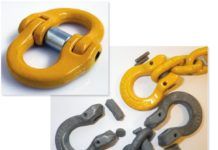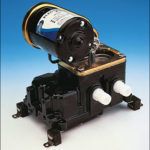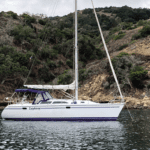Home Search
pumps - search results
If you're not happy with the results, please do another search
Freshwater Pumps
The Johnson Aqua Jet Uno 3.4 is impressive in a combination of ways. But it's a whopper. Check the Flojet Quad II—good price and performance.
Solar-powered Bilge Pumps Bail Out Small Boats
Practical Sailor tested two small solar-powered bilge pumps: the Easy Bailer (500 gallons per hour) and the SeaJoule Solar Bilge Pump (360 gallons per hour). Each self-contained unit has a small re-chargeable 12-volt battery, a fused low-capacity electric pump, and a pump switch, all housed in a plastic box with a 3/4-inch discharge hose and a remote solar panel. Testers evaluated each product’s performance and its components' quality of construction, features, how easily the unit could be maintained, and how well the electrical bits were wired and protected.
PS Advisor: Are Diaphragm Bilge Pumps OK?
My boat has an ITT/Jabsco 36600 diaphragm bilge pump that does not sit in the bilge and is rebuildable. With an 8-foot head on the pump installation, I think this type of pump may be a better type for me than the electric centrifugal pumps you reviewed in the September 2010 issue—although they are more expensive. You did not include any diaphragm pumps in your review. Was there a reason? Do you plan to test this type of pump and perhaps compare them to the ones reported on in the September article? Any information on diaphragm pumps versus centrifugal pumps would be greatly appreciated.
Mailport: Tillers, bilge pumps, and lazy jacks
TILLERS VS. WHEEL
I sailed a Yankee 30 for 10 years — tiller steering — and recently moved up to a “big sister” of the...
Offshore Log: Kiwi Spars, Hatches, and Pumps
From the most traditional polished metal galley pumps to the latest carbon fiber tech, New Zealand has a good grip on the marine gear marketplace. Nick Nicholson continues his series.
Mailport: Tillers, bilge pumps, and lazy jacks
REDUCING CHAIN TWIST
With regards to responses to your Inside PS blog post on chain twist “How Well Do Swivels Reduce Chain Twist?” as with...
Installing Washdown Pumps
Most washdown pumps are plumbed to draw directly from the water you’re sailing in (fresh or salt), in which case, the amount of water available for use is unlimited. The only problem with using a raw-water system in salt water is the residue left behind—although a salty boat is often better than a nasty one. A second option is feeding the system from the boat’s freshwater tank. This will typically limit the amount of water you can use, but it does offer the advantage of reducing the effects of corrosion on metals via freshwater washdowns.
Backup Bilge Pumps
If I ever discover seawater sloshing around my cabin floor, I cannot be sidetracked by the need to operate a manual bilge pump; I need to be free to search for the leak and correct it. A reliable, high-capacity, electric bilge pump, reserved just for emergencies, is a necessity. On board our boat, Brick House, a Valiant 40, we mounted the backup pump in the extreme forward bilge area, which never gets wet in normal conditions but would certainly be flooded about the time the floorboards started to float. In fact, a manual bilge pump was once located there.
Offshore Log: Thoughts on Engine Spares For Cruising
Emptying out the spares inventory for Calypso's Perkins diesel was an eye-opener—there were plenty of parts back-ups, and, in Nick's view, all for the best of reasons.
Seepage or Flooding? How To Keep Water Out of the Boat
Boats are made to live on water, but that does not mean they are impervious to the stuff. Some systems, like the electrical system...









































